
All our tools and guides are free to use but can not be reproduced for sale or placed behind a paywall or subscription based portal. The work is licensed under a Creative Commons Attribution-NonCommercial-ShareAlike 4.0 International License.
How can you protect yourself and others from Coronavirus?
PDF Version | HTML VersionManagement Guidelines for District Hospitals during COVID-19 – Generic Low-middle income country 30.06.2020
This operational guideline is based on guidelines of WHO, China, the UK and other countries with experience of COVID-19. Adapt and use this together with national guidelines and the specific WHO COVID-19 guidelines The aim is to manage people ill with possible COVID-19 while continuing other essential care and prevention.
PDF Version | HTML VersionModule for Rural Health Facilities during COVID-19 – Generic Low-middle income country 30.06.2020
The aim is to manage people ill with possible COVID-19 while continuing other essential care and prevention - including NCDs such as hypertension, diabetes and chronic lung diseases.
PDF Version | HTML VersionHealth Facility deskguide in the context of COVID-19 – Generic for low-middle income countries 30.06.2020
Diagnosing and treating regular common infections in the context of COVID. Read together with the COVID training module
PDF Version | HTML VersionHealth Facility deskguide in the context of COVID-19 – Nigeria 16.06.2020
Diagnosing and treating regular common infections in the context of COVID. Identify high risk of COVID in CVD, hypertension, diabetes, COPD etc. patients. Use together with your NCD deskguide and other treatment guidelines.
PDF Version | HTML Version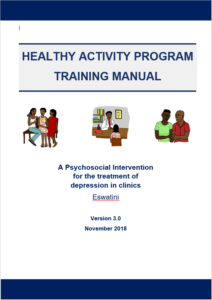
Healthy Activity Programme (HAP) Training Manual – Eswatini
This HAP training manual is a psychosocial intervention for the treatment of depression in clinics, created for use by non-specialist healthcare professionals across Eswatini in order to understand, screen for and manage depression. COMDIS-HSD coordinated the adoption of the PREMIUM Healthy Activity Programme (HAP) for the local context in Eswatini as part of its study evaluating the delivery of an intervention to improvde psychosocial care for HIV/TB patients living in the Lubombo region.
PDF Version | HTML Version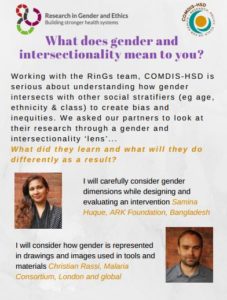
BLOG: What does gender and intersectionality mean to you?
COMDIS-HSD is serious about understanding how gender intersects with other social stratifiers (eg age, ethnicity and class) to create bias and inequities. We asked our partners to look at their research through a gender and intersectionality 'lens'. What did they learn and what will they do differently as a result?
PDF VersionMDR-TB Consultation Desk Guide
National TB Control Program - Pakistan (Draft March 17, 2011)
PDF Version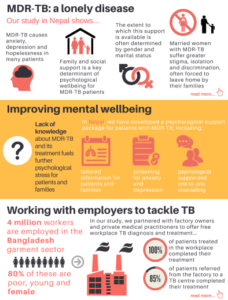
TB and MDR-TB infographic: We're leaving no-one behind
Treatment for multi-drug resistant TB (MDR-TB) is long, arduous and financially crippling for many patients in low-income countries. Find out how our research is helping improve mental wellbeing and treamtment completion rates for some of the most vulnerable and marginalised populations in Nepal, Bangladesh and China.
PDF Version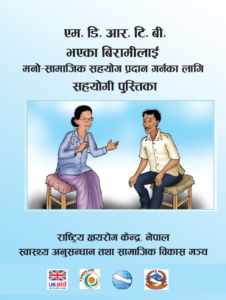
Desk guide on psychosocial counselling for health workers treating MDR-TB patients, Nepal
This desk guide, in Nepali, is one of a suite of information, education and communication (IEC) materials designed as part of our intervention for improving the psychosocial wellbeing of MDR-TB patients and their families in Nepal.
PDF Version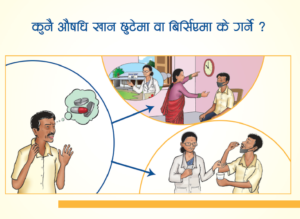
MDR-TB flipbook for health workers, Nepal
This flipbook has been produced as part of our study into improving the psychosocial wellbeing of MDR-TB patients and their families. Written in Nepali, its aim is to help guide health workers as they educate and advise patients during consultations.
PDF Version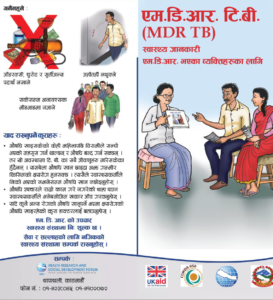
Information and education leaflet for MDR-TB patients, Nepal
Our research shows that lack of information about MDR-TB and its treatment can add to patients' anxiety and depression. This leaflet, in Nepali, is part of a suite of information, education and communication (IEC) materials produced address this knowledge gap, not just for patients, but for families and health workers too.
PDF Version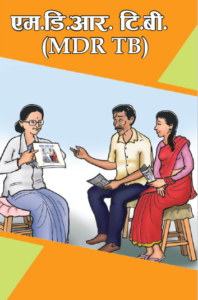
Information and education leaflet for MDR-TB patients' families, Nepal
Our research in Nepal shows that families are crucial in supporting MDR-TB patients through their long and difficult treatment regimen. This information leaflet in Nepali is aimed at helping families understand more about the disease, its treatment and supporting the patient.
PDF Version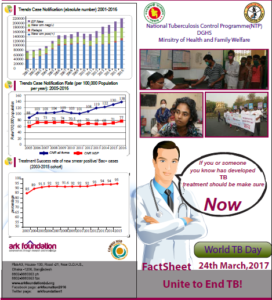
World TB Day 2017 factsheet, Bangladesh
ARK Foundation, Bangladesh, has produced this leaflet in partnership with the NTP to mark World TB Day 2017. As well as background information about the TB burden in Bangladesh, it summarises current disease data and the latest country-wide achievements to fight TB.
PDF Version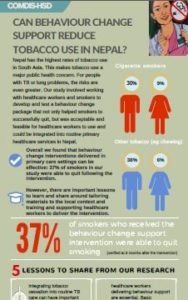
Infographic: Can behaviour change support reduce tobacco use in Nepal?
Overall we found that behaviour change interventions delivered in primary care settings can be effective: 37% of smokers in our study were able to quit following the intervention. However, there are important lessons to learn and share around tailoring materials to the local context and training and supporting healthcare workers to deliver the intervention. This infographic captures the key results and learning points from our research.
PDF Version | HTML Version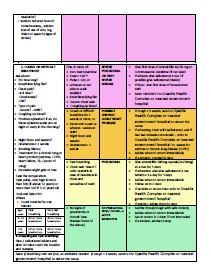
Integrated Prevention and Management of Selected Acute and Chronic Illness (IPMSACI) – Job Aid
This quick-glance guide is designed to help Community Health Care Providers (CHCPs) prevent and manage a range of acute and chronic illnesses in adults.
PDF Version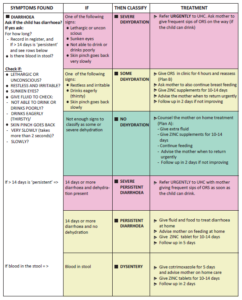
Integrated Management of Childhood Illness (IMCI) Job Aid – English version
This job aid is an English translation of a Bangla quick-glance guide designed to help Community Health Care Providers (CHCPs) diagnose and treat six major diseases.
PDF Version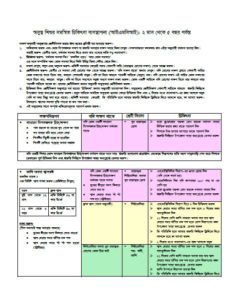
Integrated Management of Childhood Illness (IMCI) Job Aid – Bangla version
This job aid is the Bangla version of a tool distributed among 14,000 Community Health Care Providers (CHCPs) in Bangladesh. It reminds CHCPs what to ask and look for in the diagnosis and treatment of six major diseases.
PDF Version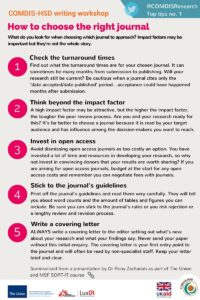
Top tips 1: How to choose the right journal
5 quick but crucial tips on how to choose the right journal when you are publishing your research. This is one of a series of 6 top tips sheets developed during the COMDIS-HSD Writing Workshop.
PDF Version | HTML Version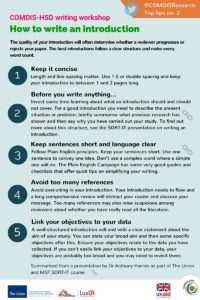
Top tips 2: How to write an introduction
The quality of your introduction could determine whether a reviewer progresses or rejects your paper. These top tips, developed during the COMDIS-HSD Writing Workshop, will help you stay on track.
PDF Version | HTML Version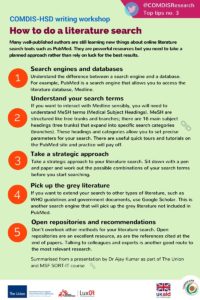
Top tips 3: How to do a literature search
How do you get the most from online literature search tools? Read these top tips drawn from our expert mentors at the COMDIS-HSD Writing Workshop.
PDF Version | HTML Version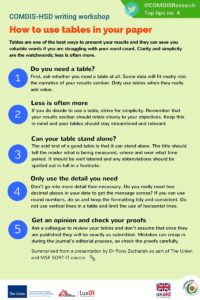
Top tips 4: How to use tables in your paper
Use these quick tips - developed during the COMDIS-HSD Writing Workshop - to find out whether your tables pass the litmus test for clarity, relevance and usefulness.
PDF Version | HTML Version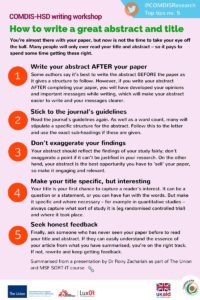
Top tips 5: How to write a great abstract and title
It is important that your abstract is neither written too early, nor handled as a rushed afterthought. See these top tips from our expert authors at the COMDIS-HSD Writing Workshop.
PDF Version | HTML Version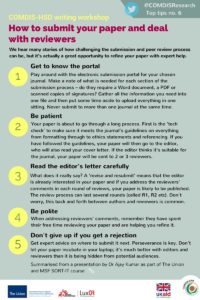
Top tips 6: How to submit your paper and deal with reviewers
What can you expect from the submission and review process and how can you make it a smooth as possible? Find out by reading these quick tips developed during the COMDIS-HSD Writing Workshop.
PDF Version | HTML Version

